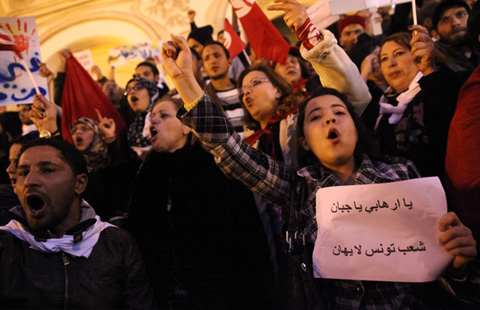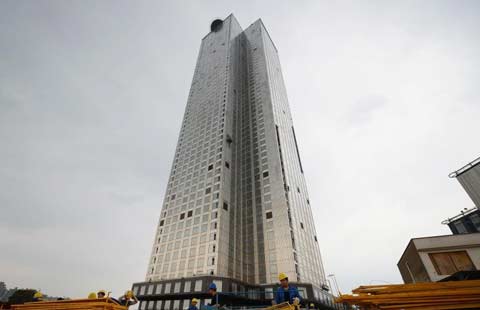
 |
|
A damaged bus is seen after an attack by gunmen on Tunisia's national museum in Tunis, March 18, 2015. [Photo/Agencies] |
TUNIS, Tunisia - The Islamic State group claimed responsibility Thursday for the attack that killed 21 people at a museum. But Tunisian authorities said the two slain gunmen had no clear links to extremists, and analysts said existing militant cells are merely being inspired by the group, rather than establishing its presence across North Africa.
Police announced the arrest of five people described as directly tied to the two gunmen who opened fire Wednesday at the National Bardo Museum. Four others said to be supporters of the cell also were arrested in central Tunisia, not far from where a group claiming allegiance to al-Qaida's North African branch has been active.
Tunisians stepped around trails of blood and broken glass outside the museum to rally in solidarity with the 21 victims - most of them foreign tourists from cruise ships - and with the country's fledgling democracy. Marchers carried signs saying, "No to terrorism," and "Tunisia is bloodied but still standing."
In claiming responsibility for the attack, the Islamic State group issued a statement and audio on jihadi websites applauding the dead gunmen as "knights" for their "blessed invasion of one of the dens of infidels and vice in Muslim Tunisia."
Several well-armed groups in neighboring and chaotic Libya have already pledged their allegiance to Islamic State based in Iraq and Syria, but the attack of such magnitude in Tunisia - the only country to emerge from the Arab Spring uprisings with a functioning democracy - raised concern about the spread of extremism to the rest of North Africa.
Analysts cautioned against seeing every such attack as evidence of a well-organized, centrally controlled entity spanning the Middle East, saying instead that small groups could merely be taking inspiration from the high-profile militant group.
"I think (the Islamic State) is probably taking credit for something it may not have played a role in," said Geoff Porter, a security analyst for North Africa.
Even as it is under pressure from rival militias in Libya and US-backed forces in Iraq, the extremist group appears to be trying to raise its profile by associating itself with attacks around the region.








